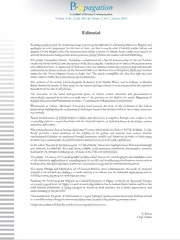
Preview Editorial
Volume 4, No. 2, July 2013 & Volume 5, No. 1, January 2014 Editorial Nothing could possibly be as disconcerting as penning the editorial of a belated publication. Regrets and apologies do not compensate for the loss of time, yet that is exactly what I humbly tender before our readers. On the brighter side, this combined issue brings a variety of articles from a wide cross section of authors from diverse backgrounds and experience, which I believe our readers will find interesting. The article 'Leonardian Dream : Tempting Completeness by a Special Interweaving of Art and Science' breaks the barrier between arts and science while discussing the contribution of famous Hungarian artists who utilized the laws of optics and created innovative and intricate artistic presentations that were recently exhibited in the Indian network of the National Gallery of Modern Arts in Bangalore, Delhi and Mumbai under the title 'From Organic Forms to Light Art'. The article exemplifies the idea that light not only makes objects visible, but it also creates art in a direct way. The authors of the article 'Electromagnetic Radiation from Mobile Phone and its Effects on Human Brain' discuss the results of their study on the subject and urges the users to be careful about the radiation hazards from the use of cell phones. The trajectory of the initial deleopmental phase of Indian science museums and planetariums is interestingly captured in an interview with one of the pioneers on the field in the article 'Beginning of Science Museums and Planetariums in India – Contribution of Ramanatha Subramanian'. 'Planetarium at Calicut - Malabar's Astronomy Hub' narrates the story of the evolution of the Calicut planetarium highlighting the technological challenges faced in the process and how those were overcome successfully. 'Social Inclusiveness of Indian Science Centres and Museums: a snapshot through case studies' is the concluding part of a sequel that deals with the financial aspects of inclusion issues in the Indian science museums and centres. 'Presenting abstract ideas in Science Museums/Centres: Mathematics Gallery of BITM, Kolkata : A Case Study' provides a brief overview of the exhibits in the gallery and explains how various abstract mathematical concepts are explained through interactive models and hands-on activities to help young learners enjoy mathematics in a playful manner and appreciate its inner order and beauty. In the article 'Science in the Baburnama: A Critical Study', the author highlights how Babur painstakingly and minutely recorded the flora and fauna, wildlife, socio-economic conditions, demographic scenario, land and rivers, climatic conditions etc. of India in the 15th and 16th century. The article ' A Century of Crystallography' profiles a brief history of crystallography and highlights some of the important applications of crystallography in our life and in addressing development issues such as food security, safe drinking water, health care, sustainable energy and environmental mitigation. The article 'Design and Fabrication of a Universal Robotic Arm' communicates the result of students' research work towards developing a versatile and low cost robotic arm for industrial applications such as welding, cutting, painting etc. with high accuracy. 'Studying the Anthropogenic Impacts on Coastal Ecosystem of Digha: A Hands-on Approach' focuses on a much argued issue of Digha's costal ecostem degradation due to human interventions and how the local student community is being engaged in hands-on field activities for a better appreciation and understanding of the problem. 'Thermochromic Property of Dichromate in Liquid Nitrogen' presents some interesting findings related to reversible colour change in ammonium dichromate crystals in liquid nitrogen temperature. I hope our readers will find the articles interesting and informative. E Islam Chief Editor
